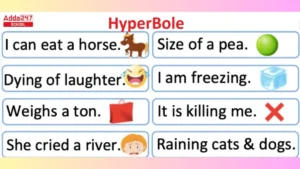Table of Contents
The indefinite pronouns are one of the special types of pronouns that sends fears among students as they do not know much about this. You might have frequently hear about Personal Pronouns, Reflexive pronouns, Possessive pronouns, Demonstrative pronouns, etc., but the pronouns of indefinite type is not taught about much. However, these pronouns are an important part of English grammar and plays a significant role in indicating certain conditions of nouns.
Indefinite Pronouns
Pronouns can relate to more than just one specific person, thing, location, or animal. It can also be used to refer to an infinite number of things and to no particular person, animal, or object. Find out more about indefinite pronouns, their meaning, and sentence usage examples in this post. After going through this article, we promise you that you will never face any difficulty while encountering these pronouns.
Indefinite Pronouns Definition
A pronoun that replaces non-specific nouns is known as an indefinite pronoun. Pronouns that are indefinite can be used both alone and plurally. Words that do not specifically relate to any one person, thing, or quantity comes under these pronouns. They are employed when it is not necessary to give the precise name or number of the object under discussion.
Let us view the definition of indefinite pronouns by different dictionaries below.
Oxford Learners Dictionary: An indefinite pronoun is defined as “a pronoun that does not refer to any person or thing in particular, for example, ‘anything’ and ‘everyone’.
Mariam-Webster Dictionary: A pronoun that does not refer to a specific person or thing.
Macmillan Dictionary: A pronoun that does not refer to any particular person or thing, for example, ‘anybody’, ‘everyone’, or ‘anything’.
Examples of Indefinite Pronouns
Some of the most commonly used pronouns of type Indefinite are given below.
- anybody
- nobody
- everybody
- somebody
- anyone
- everyone
- anything
- something
- everything
- someone
- no one
- nothing
Types of Indefinite Pronouns
There are multiple types of these special pronouns based on the things they refer to. There are various general groups to which indefinite pronouns typically belong. Some of the important types are discussed hereunder.
Singling Out
They are able to convey the idea that someone or something is being singled out within the group.
- Alec thought either of the pairs of trousers would be a good option for work.
- The child thanked each of their friends for coming to their birthday party.
- Neither of the two vegetarian options on the menu appealed to Lin.
Quantities and Amounts
These indefinite pronoun types refer to general amounts and quantities.
- Many of the students at the university speak multiple languages.
- Sometimes I make a sandwich and eat only half.
- I could say more, but I think you’ve heard enough.
- Do you like Ethiopian restaurants? Greta can recommend some.
One Non-Specific Object
They could be pointing to a single, vague, or unidentified individual or object.
- Jan thought he remembered hearing something out of the ordinary while he was sleeping.
- Someone left their shoes on the lawn last night.
All of Something
These Indefinite pronouns can be used to refer to everything, to every element, or to every person in a group.
- Everybody needs shelter and food.
- I’ve tried everything on the menu at that restaurant.
- All are welcome.
Absence
These types of pronouns points to absence of something.
- I wanted to buy a pastry at the bakery, but none were left.
- Nothing compares with the smell of coffee in the morning.
- Maryam stopped by her neighbors’ apartment, but nobody was there.
Multiple Possibilities
They are able to communicate an extensive or limitless array of options.
- Have you invited anybody to the dance yet?
- I can recommend any of the menu items here.
Indefinite Pronouns Usage
These pronouns follow other rules of English grammar just like every other components of the parts of speech. Keep this in mind before you begin using indefinite pronouns. Singular pronouns use the verb’s singular form, just like all other pronouns do, and plural pronouns take its plural form. Students can better understand the usage of these pronouns by going through the sentence formation examples given hereunder.
| Indefinite Pronouns List | Usage in Sentence |
| Everyone | Can everyone sit down, please? |
| Everybody | Everybody reached here on time. |
| Other | They wanted to find out who the other was. |
| Nobody | Nobody was okay with what was happening around them. |
| Someone | Could someone tell me where to find a doctor? |
| Both | I think I love both. |
| Nothing | Nothing happened yesterday. |
| Another | Another one of them entered the house. |
| None | Allison had invited all of her cousins, but none had come yet. |
| Something | I do not like that there should always be something to do. |
| Several | Did you look at the options? There are several. |
| Many | Many have been asked to come for the audition. |
| Any | I was looking for a pencil. Is there any left? |
| Some | I have a lot of chocolates. Do you want some? |
| All | All have arrived on time. |
| Everything | I found everything I was looking for. |
| Anyone | Is there anyone who likes a pretzel? |
| Somebody | Somebody took my bag from the shelf. |
| Anything | Anything would be fine for me. |
| Each | The teacher asked each to present their projects. |
Key Points About Indefinite Pronouns
Some of the important points about indefinite pronouns that will help you is given below.
- Not all indefinite pronouns are singular, although the majority are.
- An indefinite pronoun must agree in number with the sentence’s verb when it serves as the subject of the sentence.
- Indefinite pronouns do not change form as they go between the subjective and objective cases.
- Negation can be expressed by utilizing the not and any-indefinite pronouns or the no-indefinite pronouns.
- Indefinite pronouns are frequently used with modifiers to make their meaning clear.
Indefinite Pronouns Exercise
You must have gained a fair amount of knowledge about the indefinite pronouns. By knowing the information given in the above post, you can be assured that you will solve all the important questions in every exam related to indefinite pronouns.
Ally invited _________ to the party.
I think __________ took my science text book.
____________ wants to know what is going on around here.
Can _____________ tell me what is happening here?
The doctor asked Telly not to eat _________ as the test should be taken on an empty stomach.
___________ will be coming home for dinner tonight.
I was looking for ______ ice cubes. I did not find _________ here.
Is it possible for you to give me ___________?
The nurse asked ____________ to settle down according to their slot numbers.
___________ liked the movie.
| Check Related Articles | ||
| Relative Pronouns | Personal Pronouns | Possessive Pronoun |
| Reflexive Pronoun | Object Pronouns | Abstract Nouns |
| Common Nouns | Collective Nouns | Compound Nouns |





 Hyperbole- Explanation, Definition, Exam...
Hyperbole- Explanation, Definition, Exam...
 500+ Antonyms Words List for Kids, Downl...
500+ Antonyms Words List for Kids, Downl...
 Vocabulary Words with Meaning and Senten...
Vocabulary Words with Meaning and Senten...










